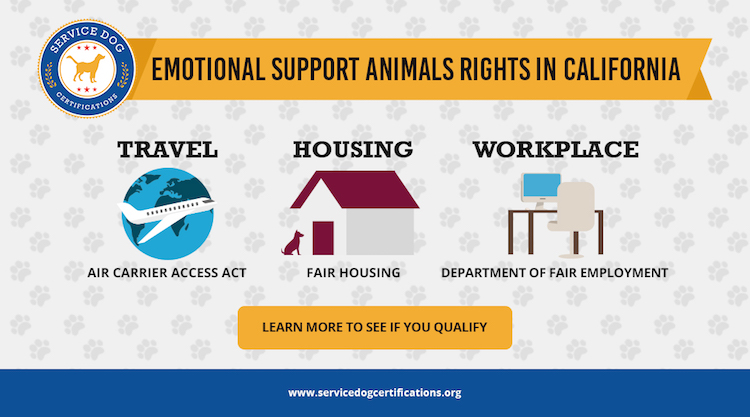Emotional Support Animals in the Workplace in California

California expanded the definition of support animal in 2016 and removed training requirements.
California law is more expansive than federal law when it comes to the rights that disabled employees have to bring ESAs into the workplace. That protection increased when the Department of Fair Employment and Housing regulations were amended effective April 1, 2016 to make two key changes to the legal treatment of emotional support animals in the workplace in California, which include:
• Expanding the definition of “support animal”
• Removing the requirement that assistance animals must be trained.

California did not recognize support animals as a type of reasonable accommodation for employees with disabilities until 2012, when the law was changed to specifically include ESAs within the definition of assistive animal. The definition of what constitutes an emotional support animal under California law was expanded with the 2016 amendments. An emotional support animal “provides emotional, cognitive, or other similar support to a person with a disability, including, but not limited to, traumatic brain injuries or mental disabilities, such as major depression.”
California law also previously required that assistive animals be “trained to provide assistance for the employee’s disability.” That requirement was eliminated with the 2016 amendments and now assistive animals, which includes support animals, no longer need special training.
Required ESA Documents For the Workplace
California law requiring reasonable accommodation for ESAs applies to employers who have five or more employees. According to the CalChamber, employers may require the following documents for people in need of an ESA in the workplace:
• Documentation from the employee’s health care provider of the need for the animal (an example would be why the animal is necessary as an accommodation to allow the employee to perform the essential functions of the job).
• Confirmation that the animal will behave appropriately in the workplace and meet the minimum standards for assistive animals. (California Code of Regulations, Title 2, Sections 11065(a), 11069(e).)

How to Get an ESA Letter
In order to get your ESA letter, you must contact a licensed therapist that can provide documentation on your need for having an emotional support animal. The ESA letter must be written on the letterhead of the licensed therapist. We have a great in depth resource on how to get an ESA letter here.
Restrictions on ESA’s in the Workplace
Employers can impose some requirements on emotional support animals, including requiring that the ESA be free from offensive odors, display habits appropriate for the workplace, and not endanger the health or safety of the disabled employee or others.
ESA Letter for the Workplace
An employee should be prepared to present a letter from a licensed mental health professional which documents the employee’s restrictions and need for accommodation. It is critical to note that a legitimate ESA letter will come from a licensed mental health professional – we work with ESA Doctors since they always match clients with mental health professionals licensed to practice in their state. Some providers of ESA letters may provide letters that are not from LMHPs licensed to assist you. The Department of Fair Employment and Housing has taken the position that these types of fake letters are not sufficient. Employees should also keep in mind that it is unlawful for an employer to retaliate against an employee for requesting a reasonable accommodation of a disability, regardless of whether the employer ultimately grants the request.
About the Author: The writing team at Service Dog Certifications is made up of folks who really know their stuff when it comes to disability laws and assistance animals. Many of our writers and editors have service dogs themselves and share insights from their own experiences. All of us have a passion for disability rights and animals.
2 comments
Leave a Reply Cancel reply
Latest Posts

Can you bring a service dog to a museum?
Yes, you can bring your service dog to the museum! All the major U.S. museums welcome guests with service animals in accordance with the Americans with Disabilities Act (ADA). There are some areas, however, that might be off-limits. Here’s what you should know if you plan to spend a day at the museum with your […]

Read More

How to Bring a Service Dog to Six Flags Magic Mountain
Service dogs are welcome at Six Flags Magic Mountain so long as they are, according to Six Flags, “trained to do work or perform tasks for people with disabilities.” Of course, your dog must be housebroken and remain on a leash or harness and under your control while at the park — and the park […]

Read More

When Stores Can Refuse Your Service Dog
According to the Americans with Disabilities Act (ADA), service dogs should be allowed into any store most of the time. A store owner can legally exclude a service dog if they are actively growling, snapping at, or frightening customers, or if the dog is obviously out of the control of its owner. Ordinary behaviors — […]

Read More

I have a ESA i suffer from ptsd, anxiety, and panic attacks i have had my dog for 11 years, she is trained, she is potty trained, she does not display any aggression or problematic behaviors that would compormise and safety issues.
My employer approved my letter 6 months ago and now suddenly im being told i have to follow a policy i was never informed of and because of this i now can not have my dog at work with me . This is truly cause my mental health to become unstable, no one wants to hear me out and im really needing some support with how to handle this situation can someone please advocate for me or to me about how to support myself through this process
It’s odd that your workplace approved your ESA but they are now backtracking. That seems incredibly unfair. Employers are not legally obligated to accept emotional support animals or ESA letters in the workplace, but if they choose to voluntarily allow for an ESA it seems cruel to later renege on the promise.